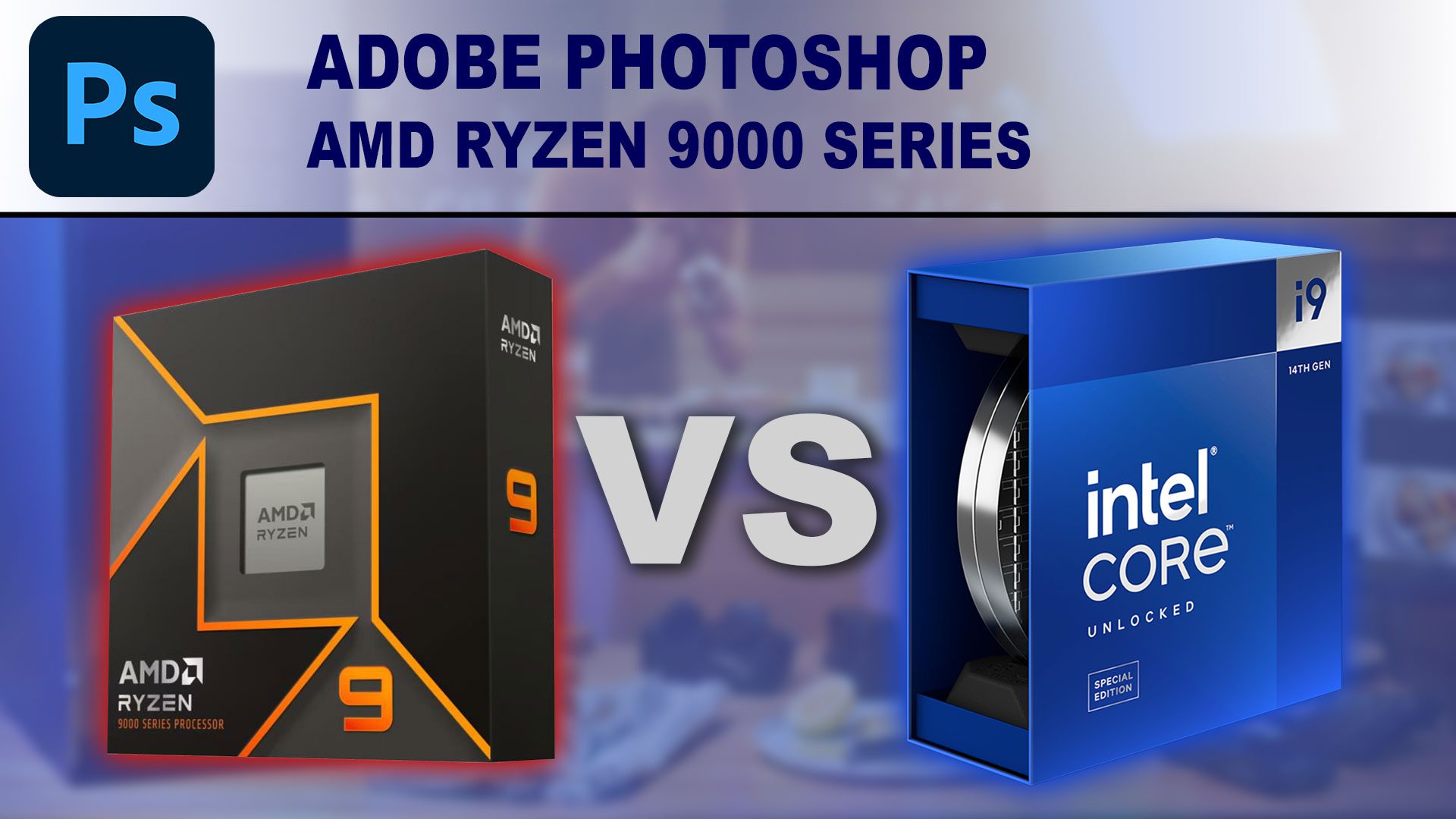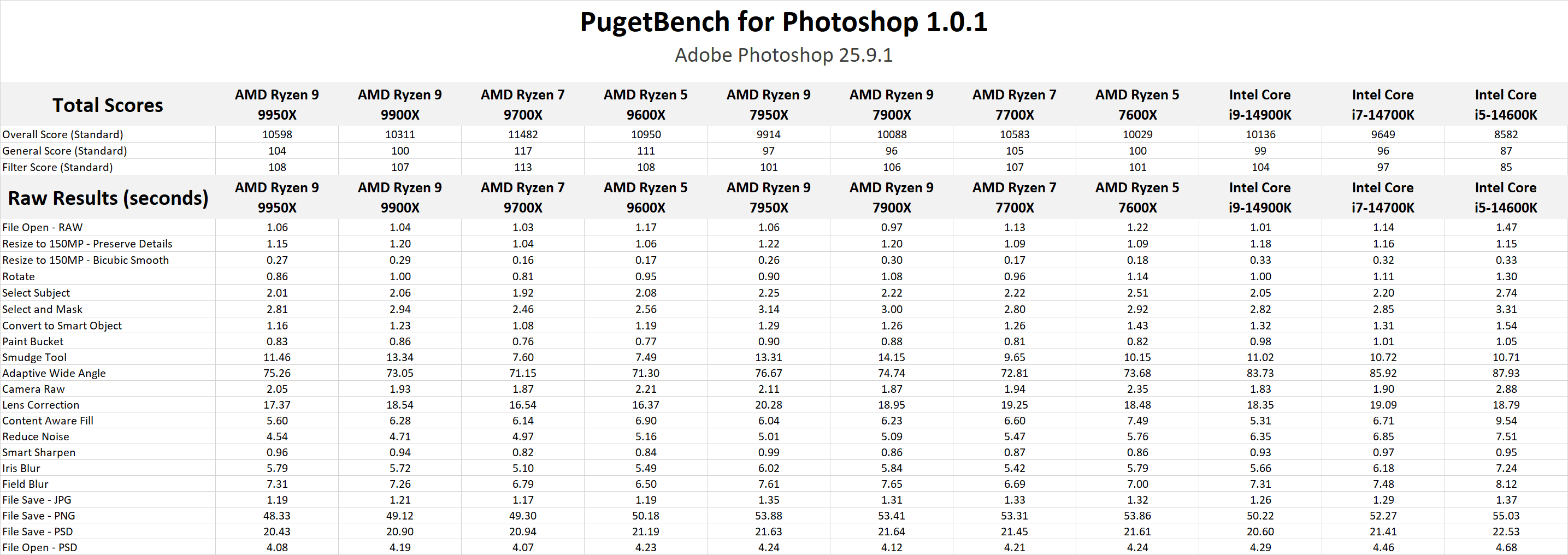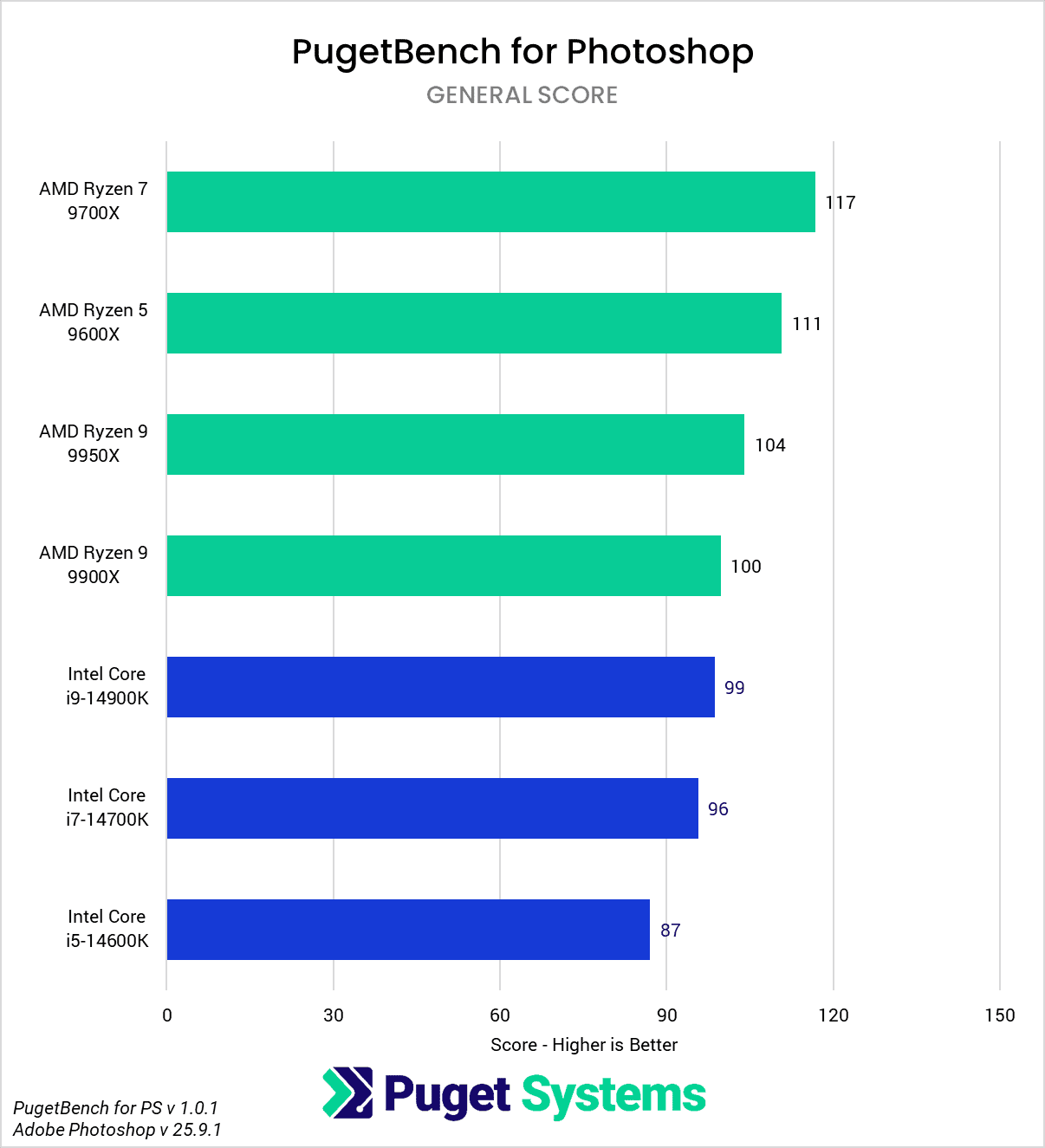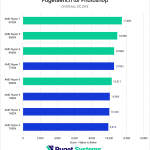Table of Contents
TL;DR: AMD Ryzen 9000 Series Processor Performance in Photoshop
Overall, AMD’s new Ryzen 9000 Series Processors perform very well in Adobe Photoshop. The most significant generation-over-generation improvements came from the Ryzen 5 9600X and Ryzen 7 9700X, both of which scored about 10% higher than the 7600X and 7700X, respectively. The Ryzen 9 9900X and 9950X, however, showed minimal performance gains.
This performance uplift is enough to put AMD firmly in front of Intel, with AMD’s largest lead coming at the bottom of the stack with the Ryzen 5 9600X beating the Core i5 14600K by 28% and the Ryzen 7 9700X beating the Core i7 14700K by 19%. In fact, the 9700X is the fastest processor we have tested for Photoshop to date; beating the 9900X and 9950X, and even performing 13% faster than Intel’s top-end Core i9 14900K.
Introduction
AMD has recently launched its new Ryzen 9000 Series processors, which are a fairly minor refresh to its existing Ryzen 7000 processors. Utilizing the same AM5 socket and compatible with existing X670 motherboards, Ryzen 9000 is based on AMD’s new Zen 5 CPU architecture, which promises increased IPC (Instructions Per Clock), improved efficiency, and better memory support.
In this article, we will examine how these new processors perform specifically in Adobe Photoshop. Intel has often held the lead in this type of application due to their higher single-core performance, but multiple factors could change things this time around. The first is simply AMD’s improvements to the new Ryzen 9000 processors. But second, this is our first in-depth CPU testing using our recently launched PugetBench for Photoshop v1.0 benchmark, which includes a number of updates to bring it more in line with modern Photoshop workflows. Our benchmarks are designed to test real-world tasks and workflows, and it is entirely possible that we will see something different in terms of “AMD vs Intel” performance with our new and improved benchmark tests.
Because we will be examining so many CPUs, we will divide our analysis into Intel vs. AMD (AMD Ryzen 9000 vs. Intel Core 14th Gen) and performance versus the previous generation (AMD Ryzen 9000 vs. AMD Ryzen 7000).

If you want to read more about the new AMD Ryzen 9000 CPUs and what separates them from the previous generation, we recommend checking out our main AMD Ryzen 9000 Series Content Creation Review article. That post includes more detailed information on the CPU specifications, MSRP, and an overview of testing results for a range of other applications, including Premiere Pro, DaVinci Resolve, After Effects, Unreal Engine, Cinema 4D, Blender, and V-Ray.
Raw Benchmark Data
We design our benchmarks to cover many workflows and tasks to provide a balanced look at the application and its hardware interactions. However, many users have more specialized workflows. Recognizing this, we like to provide individual results for benchmarks as well. If a specific area comprises most of your work, examining those results will give a more accurate understanding of the performance disparities between components.

AMD Ryzen 9000 vs Intel Core 14th Gen for Adobe Photoshop
If you look at our previous consumer-level Photoshop CPU article (Adobe Photoshop: Intel Core 14th Gen vs AMD Ryzen 7000), Intel held about a 15% performance over AMD. Interestingly, things are almost exactly flipped this time, with the AMD Ryzen 9700X taking the top performance spot and coming in at 13% faster than Intel’s Core i9 14900K. In fact, all the Ryzen 9000 CPUs scored higher than the Intel Core 14th Gen!
Some of this is due to AMD’s gen-over-gen performance gains, which we will look at in more detail in the next section. However, an even bigger factor appears to be the test overhaul we made in the 1.0 version of our Photoshop benchmark. Our benchmarks are not designed around any specific hardware, but rather intended to match modern workflows as closely as possible. Sometimes, one brand or product type is particularly strong for specific workflows, and modern Photoshop use cases appear to favor AMD right now.
Comparing Intel and AMD CPUs in more detail is a bit tough since they do not carry matching MSRP. However, the closest matches are:
- AMD Ryzen 9 9950X ($650) vs. Intel Core i9 14900K ($590)
- AMD Ryzen 9 9900X ($500) vs. Intel Core i9 14900K ($590)
- AMD Ryzen 7 9700X ($360) vs. Intel Core i7 14700K ($410)
- AMD Ryzen 5 9600X ($280) vs. Intel Core i5 14600K ($320)
We do want to point out that in these comparisons, AMD is always a bit less expensive than Intel in terms of price, other than the 9950X vs 14900K. They also have a lower power draw, meaning less heat output and noise. Because of that, if things are close, AMD actually has the advantage.
Starting at the bottom of the stack, the AMD Ryzen 5 9600X performs exceptionally well compared to the Intel Core i5 14600K, with a 28% performance lead. The Ryzen 7 9700X also does great, coming in at a slightly lower (but still terrific) 19% performance lead over the Intel Core i7 14700K. It is worth noting that the 9700X is at the top of our performance chart, meaning that it is not only significantly faster than the 14700K, but also faster than Intel’s Core i9 14900K.
Moving up to the Ryzen 9 models, both the 9900X and 9950X scored lower than the 9700X and 9600X, likely due to the Ryzen 5 and 7 models gaining a performance boost on lightly threaded workloads like Photoshop due to them being a single CCD design. Even though the 9900X and 9950X are lower performing than the other Ryzen models, the 9900X is still on par with the Core i9 14900K, giving AMD the overall lead due to their lower price and TDP. At the top end, the Ryzen 9 9950X is slightly faster than the Core i9 14900K, but only by 5%. Given its higher MSRP, the 9950X is essentially a wash compared to the 14900K.
AMD Ryzen 9000 vs AMD Ryzen 7000 for Adobe Photoshop
When comparing the new AMD Ryzen 9000 Series to the previous Ryzen 7000 Series, you need to be aware that AMD technically introduced a small price drop with the new CPUs. However, since AMD CPUs are often on sale, the new models will be a bit more expensive in most cases. That will likely even out over time as sales start to show up for the new models, but for now, Ryzen 9000 will likely have a small price premium over the older 7000 models.
Again, starting at the lower end, the Ryzen 5 9600X and Ryzen 7 9700X see about a 9% performance uplift versus the previous-generation Ryzen 5 7600X and 7700X, respectively. The Ryzen 9 9900X, on the other hand, only saw a very small 2% higher performance compared to the Ryzen 9 7900X, which is well within the margin of error for real-world benchmarks like this. The Ryzen 9 9950X saw a slightly better gen-over-gen gain of 7% compared to the Ryzen 9 7950X.
This is very similar to what we saw in our After Effects article, which is interesting as both Photoshop and After Effects are relatively lightly threaded.
How Well Do the AMD Ryzen 9000 CPUs Perform in Photoshop?
Photoshop is unique compared to many of the other applications we regularly test in that it is very lightly threaded. In fact, it is to the point that the lower core count models from AMD often end up performing better than the higher core count ones, even though on paper, the 9900X and 9950X should have the same, or higher, maximum turbo frequency as the 9970X and 9960X.
What that means is that if performance in Photoshop is your primary concern, the relatively affordable AMD Ryzen 7 9700X is currently the fastest CPU available, beating the more expensive Ryzen 9 9900X and 9950X (and Intel’s top-end Core i9 14900K) by just over 10%. If Photoshop is more of a secondary application in your workflow, a Ryzen 9 or Intel Core CPU may still be the better choice, but for Photoshop alone, the 9700X is king.
In terms of AMD vs Intel, AMD Ryzen 9000 should give you more performance, and at a lower TDP (power draw and heat output). This is especially true with the Ryzen 5/7 models, with the Ryzen 5 9600X out-performing the Intel Core i5 14600K by a massive 28%, and the Ryzen 7 9700X beating the Intel Core i7 14700K by 19%. At the top-end, the Ryzen 9 9900X is about on par with the Intel Core i9 14900K, although its lower price and TDP give AMD the lead there as well. The 9950X is the only somewhat exception, as even though it is 5% faster than Intel’s 14900K, it also carries a $60 higher MSRP.
Overall, AMD’s new Ryzen 9000 Series Processors do very well in Adobe Photoshop, with the most significant gen-over-gen improvements coming from the Ryzen 5 9600X and Ryzen 7 9700X, both of which scored about 10% higher than the previous generation. The higher-end Ryzen 9 9950X was a smaller 7% faster, and the 9900X was within the margin of error of the previous generation. In all cases, AMD takes the lead over Intel, although it is probably not worth upgrading if you already have an AMD Ryzen 7000 processor. To know if a Ryzen 9000 CPU is worth the investment if you have an older system, we have an article planned looking at Ryzen 9000 performance compared to older processors in the near future, and you are always welcome to run the PugetBench for Creators benchmarks we use in our articles to see exactly how your current system compares.
Every application uniquely utilizes hardware, so our results here don’t necessarily translate to any other application. Our focus in this article centers specifically on AMD Ryzen 9000 Series performance in Adobe Photoshop. However, we recommend checking out our AMD Ryzen 9000 Series Content Creation Review article, which includes a broad overview of results for several different applications. If you use other software packages, it also has links to our in-depth testing articles for content creation: Premiere Pro, DaVinci Resolve, After Effects, Unreal Engine, Cinema 4D, Blender, and V-Ray.
Finding the perfect workstation doesn’t have to be complicated. Explore our solutions page for a curated selection of recommended systems for a multitude of applications and workflows, or visit our custom configuration page if you already know the ideal hardware for your needs. If you need assistance with tailoring a system to a unique workflow or have any other questions, we encourage you to reach out to our dedicated technology consultants.














